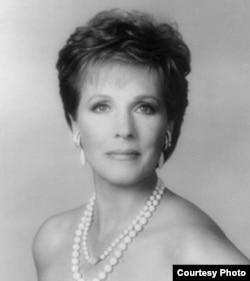From VOA Learning English, welcome to As It Is! I’m Steve Ember.
Today we meet some Americans who take part in “Out of Darkness Walks.” They go on these walks to raise money for research into depression and suicide prevention programs.
Next, we hear good news from Ethiopia: child deaths have been reduced by two-thirds.
Julie Andrews from “My Fair Lady”:
All I want is a room somewhere
Far away from the cold night air
With one enormous chair
Oww, wouldn’t it be loverly…
And finally, something quite “loverly” - we send birthday wishes to the actress and singer Dame Julie Andrews.
Early Autumn (Woody Herman band)
First, we tell how hundreds of volunteers across the United States are marking the start of autumn – and why they do it.
Every year around this time, the days seem to grow shorter in the United States. The amount of daylight has been decreasing since June 20th, the start of summer. But the increasing darkness is most apparent when autumn arrives.
Marking this change of season, thousands of Americans take part in “Out of the Darkness Walks.” The walkers remember the loved ones they lost to suicide. They also hope to raise money for suicide prevention efforts and research into depression. Depression increases the risk of people taking their own lives.
Steve Iselin served in the Navy for 20 years. He retired 13 years ago, and started looking for another job. That is also when he began feeling hopeless.
“I had a great sense of dread every day. Agony is another word that comes to mind. I didn’t want to do anything that I would normally like to do. I had no interest in seeing other people”…
Steve Iselin found a job. But he left after one week because he told himself he could not do the work. Everything he did seemed very difficult. Decisions were painful, even having to choose what he would wear that day or what to eat.
Mr. Iselin was suffering from depression.
Bob Gebbia heads the American Foundation for Suicide Prevention. He says being depressed is very different from being sad or having a bad day. He says that about 20 million people are found to have clinical depression in the United States every year.
Mr. Gebbia says the cause could be a combination of genetic influences, changes in brain chemistry or environmental reasons. He notes that some people are more likely than others to get depressed.
“You may not have had the kinds of experiences in life that bring it out. Let’s say you lose your job, or, you know, divorce, a loss of someone.”
Steve Iselin was lucky. His wife recognized the signs of depression. She helped him get the expert care he needed. But he says that was not true of his brother’s son. Mr. Iselin says his nephew became depressed a few years later and killed himself.
A year after his nephew’s death, Mr. Iselin visited his brother in San Francisco and heard about the Out of the Darkness Walk. The American Foundation for Suicide Prevention organized the event. Both men took part.
Steve Iselin said that was the first day his brother understood that perhaps he was not to blame for his son’s death.
Since then, Steve Iselin has volunteered with the American Foundation for Suicide Prevention. He has taken part in seven community walks. The most recent one raised $65,000 for the cause.
You’re listening to As It Is from VOA Learning English. I’m Steve Ember.
Ethiopia reaches United Nations Millennium Development Goal...
Child survival rates in Ethiopia are improving. The United Nations’ Children’s Fund recently praised Ethiopia for reaching one of the Millennium Development Goals on child survival. UNICEF officials say the country has reduced its child deaths by more than two-thirds.
Mario Ritter has more.
Between 1990 and 2012, Ethiopia reported a 67 percent drop in the number of children dying before age five. The Minister of Health, Kesetebirhan Admasu, welcomed the news. But he says that even with the improvement, Ethiopia is considered a high-mortality country.
“If you look at the absolute number of children dying in Ethiopia, you know, it is still huge.”
The Ethiopian government, African Union Commission, and the World Food Program studied growth and development in Ethiopian children. They found that malnutrition was to blame for more than 20 percent of child deaths in Ethiopia. Diarrhea, pneumonia and malaria are the leading causes of death among young Ethiopian children.
In 1990, the country’s death rate for children under five was one of the highest in the world. The rate was 204 deaths for every 1,000 births. The rate is now at 68 per 1,000. This means that hundreds of thousands of Ethiopian children who might have died years ago now reach their fifth birthday. I’m Mario Ritter.
It’s As It Is from VOA Learning English.
Birthday wishes to a "loverly" - and much loved - actress
[Julie Andrews sings “Ten Minutes Ago” from 1957 CBS Television production of Rodgers and Hammerstein’s “Cinderella” --
Julie Andrews in 2011, accepting Lincoln Medal at Ford’s Theater in Washington]
“When all about you may be destroyed, or lying in the dust, it is the Arts that will define us as a civilization.”
A much loved performer on the musical stage and in motion pictures, Dame Julie Andrews was born on this date in 1935. Over a long career as a performer, she starred in such movies as “The Sound of Music” and “Mary Poppins”, and such musical theater productions as “My Fair Lady” and “Camelot.”
While still a teenager, Julie Andrews appeared in London and in the United States in the musical “The Boy Friend.” Then, her big break on Broadway – she won the part of Eliza Doolittle, playing opposite Rex Harrison, in the musical “My Fair Lady.”
Just you wait Henry Higgins, just you wait
You’ll be sorry, but your tears’ll be too late…
“My Fair Lady” opened on Broadway in New York in 1956, and it made Julie Andrews a star.
A few years later, in 1960, Julie Andrews played opposite Richard Burton in the musical “Camelot”.
Tra-la, it’s May, the lusty month of May…
The show was a favorite of President John F. Kennedy and his wife Jacqueline.
Julie Andrews scored what may have been her most long-lasting success in the film “The Sound of Music.”
Raindrops on roses and whiskers on kittens
Bright copper kettles and warm woolen mittens
She played a nanny, a teacher for the many children of an Austrian nobleman. The film was shot on location in the Austrian Alps, and it’s still shown on television.
A throat operation in the 1990s left Julie Andrews with a damaged singing voice. But she continues to play dramatic parts, as in the film series “The Princess Diaries” and “Despicable Me.”
Julie Andrews’ life today is busy with television appearances and international charity work.
[Julie Andrews from “My Fair Lady”]
Oww, wouldn’t it be loverly…”
As It Is is a production of VOA Learning English. Steve Ember here, hoping you had a “loverly” ten minutes with us. We’ll see you next time.







